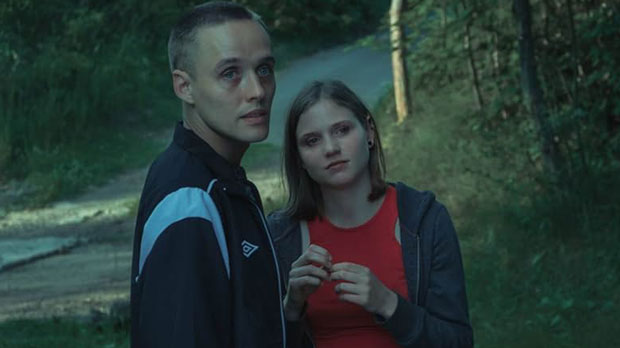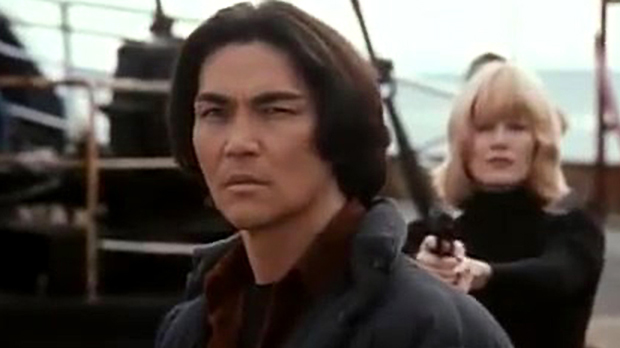 Corpus Christi (2019) Film Movement/Drama RT: 115 minutes No MPAA rating (language, drug and alcohol use, sexual content, nudity, violence, thematic elements) Director: Jan Komasa Screenplay: Mateusz Pacewicz Music: Evgueni and Sacha Galperine Cinematography: Piotr Sobocinski Jr. Release date: TBA (US) Cast: Bartosz Bielenia, Aleksandra Konieczna, Eliza Rycembel, Tomasz Zietek, Barbara Kurzaj, Leszek Lichota, Zdzislaw Wardejn, Lukasz Simlat, Anna Biernacik. Spoken in Polish w/English subtitles
Corpus Christi (2019) Film Movement/Drama RT: 115 minutes No MPAA rating (language, drug and alcohol use, sexual content, nudity, violence, thematic elements) Director: Jan Komasa Screenplay: Mateusz Pacewicz Music: Evgueni and Sacha Galperine Cinematography: Piotr Sobocinski Jr. Release date: TBA (US) Cast: Bartosz Bielenia, Aleksandra Konieczna, Eliza Rycembel, Tomasz Zietek, Barbara Kurzaj, Leszek Lichota, Zdzislaw Wardejn, Lukasz Simlat, Anna Biernacik. Spoken in Polish w/English subtitles
Rating: *** ½
A sinful person is capable of change. You either agree with this statement or you don’t. The idealists among us believe it is possible for an evildoer to turn things around and do good works while others remain firm in their belief that a leopard never changes its spots. Wherever you stand on this issue, the Polish drama Corpus Christi will challenge your thoughts on the matter.
One of this year’s Best International Feature nominees, Corpus Christi stars Bartosz Bielenia as Daniel, a youth offender who experiences a spiritual awakening while locked up in juvenile prison for some unspecified violent offense. Although sincere in his desire to become a priest, he’s told by his mentor Father Tomasz (Simlat) that his criminal record precludes him from attending seminary. Instead, he’s sent to work in a sawmill in a remote area of the country with other ex-cons. Determined to follow his dream, he presents himself as a priest in a nearby small town still reeling from the tragedy of losing six young people to a car accident a year earlier. When the town vicar (Wardejn) takes a temporary leave of absence due to health issues, Daniel is asked to fill in until he returns. He accepts the position without a single thought to the consequences.
Googling Confession protocol and Bible verses on his smart phone, “Father Tomasz” (as Daniel now calls himself) makes more of an impact on his congregation than his predecessor ever did. He’s a charismatic sort whose methods are unorthodox to say the least. As penance for striking her child, he advises a parishioner to take the boy out for a bike ride. He enjoys a beer with the town’s young people. During one of his sermons, he joyously throws holy water into the air before a cheering congregation.
For all Daniel’s good points, he ruffles a few feathers when he suggests that the allegedly drunken man who caused the accident should have his picture on the memorial board with the others. He goes on to say he should be given a proper burial in the town cemetery, something the vicar wouldn’t allow. He even reaches out to the man’s bitter widow (Kurzaj), a woman ostracized by the entire town. His efforts in this area put him at odds with the town mayor (Lichota), a man who uses his power to get whatever he wants. He tries to intimidate Daniel but given his criminal past, it’s not likely to have much of an effect.
Of course, Daniel’s charade can’t go on indefinitely. His deception is bound to be uncovered eventually. There’s a number of ways this could happen. The mayor might ask somebody to do a background check. Daniel might trip himself with an obvious lie. He could succumb to carnal temptation; the sexual tension between Daniel and local girl Marta (Rycembel) is palpable. Or somebody from his past could suddenly appear and threaten to expose Father Tomasz for who he really is. I won’t say who or what but it adds an underlying level of tension to Corpus Christi even if it is an obvious plot trajectory.
Directed by Jan Komasa (Suicide Room, Warsaw ’44), Corpus Christi is more than a sometimes darkly funny tale of a bogus priest. It’s about salvation and redemption. It’s about faith and holiness. It’s also about the hypocrisies within the Catholic Church. It teaches forgiveness and redemption yet it doesn’t allow a truly repentant person like Daniel to join the clergy because of his criminal record. But what about the vile predators who wear a collar? How are they allowed to stay once they’re found out? It’s contradictory. It should be noted that Corpus Christi is one of the few Catholic-themed films that does NOT deal with sexual abuse. It’s hinted at in one scene, but it’s not one of the topics Komasa explores. I’m merely using it as an example.
Oddly enough, Corpus Christi isn’t an angry film. It’s actually fairly objective even if it does take a sympathetic view of Daniel. In the role, Bielenia is positively brilliant. He brings this natural intensity to the role, a quality helped greatly by his icy/fiery blue eyes and intense gaze. He’s a flawed character to be sure. Prior to assuming the role of holy man, we see him at a party with his mates snorting coke and having sex with some random girl. It leads one to question his true nature. Will he be able to leave his vices behind and live the life of priest or not? There’s no clear answer. All we know is that he seems truly sorry for his past sins. Rycembel is also great as Marta, the daughter of the church’s embittered sacristy caretaker (Konieczna) who lost her son in the accident. She’s attracted to Daniel but knows she cannot act on it BUT if he was to tell her the truth, it would cause so many other problems. It’s one of the film’s most interesting story arcs.
Corpus Christi, loosely based on true events, is a well made film that makes great use of close-ups that allow viewers to closely study the characters’ expressive faces. This is especially true of Daniel whose handsome visage has this magnetic pull. The ending, an apocalypse of blood and fire, hits the exact right note. It never gets too maudlin or sentimental. It doesn’t provide easy answers to complex questions. Thought-provoking and compelling, it drags a bit here and there but it always holds your interest. It’s an intelligent film for intelligent audiences.




